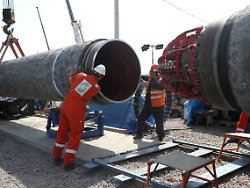Wednesday, September 22, 2021
Energy agency puts pressure
Is Russia blackmailing Europe with its gas?
From Max Borowski
The Kremlin and its gas company Gazprom are suspected of deliberately supplying Europe with insufficient gas. According to the International Energy Agency, Russia could easily refute this allegation.
The International Energy Agency (IEA) has asked Russia to deliver more natural gas to Europe in order to cushion the current shortage and the associated price explosion. For Russia this is also “an opportunity to underline its reputation as a reliable supplier for the European market,” the agency said. This reputation has recently been scratched. Politicians had assumed that the Russian government and the state gas company Gazprom were deliberately supplying Europe with less gas than needed to fill up the unusually empty gas storage facility.
In a letter to the EU Commission, a group of MEPs put forward the thesis “that the record rise in natural gas prices in Europe in recent weeks could be a direct result of deliberate market manipulation and Gazprom’s measures”. The Green Bundestag member Oliver Krischer fears that Germany will slide “into a situation with potential for blackmail” in winter. Krischer told the “Handelsblatt”: “Gazprom and Putin have cut gas deliveries to the west in order to bring the unnecessary Nord Stream pipeline into operation faster and bypassing the European rules of the game.”
Most recently, the news had further fueled the wholesale price for gas that Gazprom had booked only a third of the offered pipeline volume for transit through Ukraine to the west for the month of October, despite the high demand and record prices. In addition, statements by Gazprom and government representatives in Moscow sparked the suspicion that Russia is deliberately withholding gas via the previous delivery routes to Europe in order to force the controversial Nord Stream 2 pipeline to go into operation quickly and to full capacity. The spokesman for President Vladimir Putin had told journalists last week that Nord Stream 2 could “significantly rebalance” the price mechanism for natural gas in Europe, provided that Germany quickly concludes the approval of the pipeline.
Gazprom store almost empty
Gazprom has delivered less gas in the past few months than in the years before the Corona crisis. However, Russia and its German business partners emphasize that the exporter has complied with its contractual obligations. Russian pipeline gas is currently even cheaper than gas on the spot market, said the chief executive of the Eastern Committee of the German Economy, Oliver Hermes. “This shields Europe to a certain extent from the high world market prices.” According to Hermes, it would “help calm the market situation” if Gazprom offered additional delivery quantities.
Reports that Europe’s largest natural gas storage facility, which is operated by a Gazprom subsidiary in Lower Saxony, was apparently not replenished at all over the summer, the company countered by pointing out that the storage there is taking place in accordance with the German gas customers. In the past few years, the storage facility was almost 90 percent full at the end of the summer. Currently it is only 5 percent.
The wholesale price for natural gas at Europe’s most important trading point in Amsterdam has more than tripled since the beginning of the year. In the UK, energy-intensive fertilizer plants have already had to close. The first gas suppliers that had not secured themselves against rising prices have filed for bankruptcy. In Europe, too, numerous gas providers are increasing their prices. In addition to gas, energy sources such as coal and oil have also become significantly more expensive.
One of the causes of the price increase is the largely empty gas storage facility across Europe after the long, cold winter that has passed. These have so far only been partially replenished, as not only did Russia not deliver the expected amount, but European gas production also fell short of the volume of previous years due to technical failures. In addition, the economic upturn resulted in increased energy demand, especially in Asia. This in turn is reflected in increased demand and high prices for liquefied gas delivered by ship. Another factor is the weather-related below-average wind and solar power generation in Europe in recent months. This increased the need for fossil fuels, which at the same time drove up the price of CO2 emission certificates.
